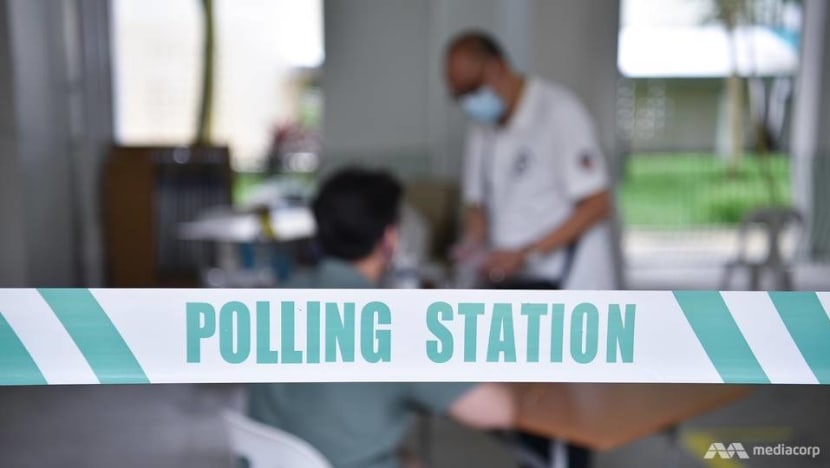Elections Department proposes new voting arrangements for overseas Singaporeans, voters in nursing homes

A polling station in Singapore. (File photo: CNA/Gaya Chandramohan)
SINGAPORE: The Elections Department (ELD) is seeking feedback about postal voting for overseas Singaporeans and special voting arrangements for people in nursing homes, it said on Wednesday (May 25).
Depending on the feedback from stakeholders, including political parties, nursing home operators and overseas Singaporeans, these may be piloted during the next presidential election, said an ELD spokesperson.
The next presidential election must be held ahead of the September 2023 expiration date of President Halimah Yacob’s term of office.
Consultations on these two new voting arrangements will be open to all political parties, and ELD will share an update on the public consultation in July, the spokesperson added.
ARRANGEMENTS FOR OVERSEAS VOTERS
Minister-in-charge of the Public Service Chan Chun Sing said in March that ELD was studying the introduction of voting by post to allow Singaporeans overseas to mail in their votes.
There are about 200,000 Singaporeans overseas, though not all are of voting age. In 2020, 6,570 overseas Singaporeans registered to vote, of whom 4,794 cast their ballots.
Many overseas Singaporeans remain engaged with Singapore and are “keen” to exercise their vote, said ELD in a press release.
Currently, overseas voters can cast their votes at any of the 10 overseas polling stations in Australia, China, Hong Kong, Japan, Dubai and the US and UK.
“This is because voting by paper ballot at polling stations is a transparent and secure method of voting that ensures the integrity of the voting process and secrecy of votes,” said the department.
“However, ELD recognises that it may not be possible for some overseas Singaporeans to travel to these overseas polling stations to vote. For example, the pandemic has highlighted how travel restrictions can make it difficult for some overseas Singaporeans to travel to the overseas polling stations to vote.”
To qualify as an overseas voter, the person must be a Singapore citizen 21 years old or older, have a registered Singapore residential or contact address, and has lived in Singapore for at least 30 days in the three-year period before the cut-off date before the elections.
They must also not be disqualified from being an elector under any other prevailing laws.
The authorities also studied other options for overseas voters, such as setting up more overseas polling stations. However, this will be “very resource intensive” and may not fully address the issue of accessibility, said ELD.
While many countries have implemented postal voting, some common challenges include keeping the ballots safe and secure, difficulties in making sure the person who marked the postal ballot is the voter and not under duress, and ensuring that the ballots will be posted and received in time to be counted.
There may also be a discrepancy between the number of postal ballot papers issued and the number of votes received, which may “cast doubts” on the integrity of the process.
In implementing voting by post from overseas, ELD is considering delivering the postal ballot papers and return envelopes to overseas voters by “electronic means”, it said.
For example, this could include requiring voters to log into ELD’s website using Singpass to download and print the ballot papers and return envelopes.
ELD may also require overseas Singaporeans to submit a specimen signature when registering as postal voters, and then to sign on the return envelope when they mail their votes to Singapore. This will allow the authorities to authenticate the envelope, it added.
Postal voters may also be required to return their marked postal ballot papers to ELD no later than 10 days after Polling Day to be accepted for counting. They should also be posted before Polling Day in Singapore, said ELD in the press release.
SPECIAL ARRANGEMENTS AT NURSING HOMES
In the 2020 General Election, the authorities made special arrangements to allow voters on stay-home notice at designated hotels to cast their votes, and ELD plans to pilot this arrangement for voters living in nursing homes.
If this is allowed, nursing homes will no longer need to bring their elderly residents to the polling stations to vote, said Mr Chan in March.
There are more than 80 nursing homes in Singapore, with about 13,000 residents.
About 21 per cent of Singaporeans who voted in the 2020 General Election were aged 65 and above, up from 14 per cent in the 2011 General Election, ELD said.
The department is considering setting up an onsite polling station within the nursing homes’ premises, and/or deploying a mobile team to bring the ballot box and papers from bed to bed.
There are some potential challenges in implementing the special arrangements, said ELD. For example, the profile of the residents across nursing homes vary, and the assistance that each resident needs to vote “can be very different”.
"As nursing home staff provide direct care to their residents on a daily basis, we are likely to have to rely on them to assist residents who are eligible to vote to do so," said ELD in the press release.
“Concerns about the risks of residents being influenced by nursing home staff, who may be local or foreign, may arise."
The department will spell out clearly what nursing home staff can and cannot do, the spokesperson said.
For example, just like at other polling stations, staff cannot help voters to mark their ballot papers, and at least one polling agent per candidate will also be allowed to observe polling procedures, similar to the practice at regular polling stations.
ELD is planning to pilot the special voting arrangements in some nursing homes for a start, it said. It will finalise the criteria for the selection of nursing homes in the pilot after consulting the political parties and nursing homes.















